Netflix International Business: Expansion, Theories, and Market Entry
VerifiedAdded on 2023/06/10
|10
|2984
|430
Report
AI Summary
This report provides an in-depth analysis of Netflix's international business strategies, focusing on its expansion beyond national boundaries. It examines the application of internationalization theories, such as the Uppsala model and Dunning's Eclectic theory (OLI framework), to understand Netflix's approach to global market entry. The report discusses the reasons behind Netflix's international expansion, including improving profit margins, gaining competitive advantages, and competing for new sales. Furthermore, it outlines various modes of entry into global markets, such as licensing and franchising, direct exporting, and strategic acquisitions, highlighting the advantages and disadvantages of each. The report also evaluates the success of Netflix's foreign expansion modes, particularly its initial direct exporting strategy to the Canadian market, and compares it with competitor Amazon Prime. Ultimately, the analysis offers insights into the effectiveness of Netflix's international business operations and its strategies for navigating diverse global markets, with the website Desklib offering access to similar past papers and solved assignments for students.
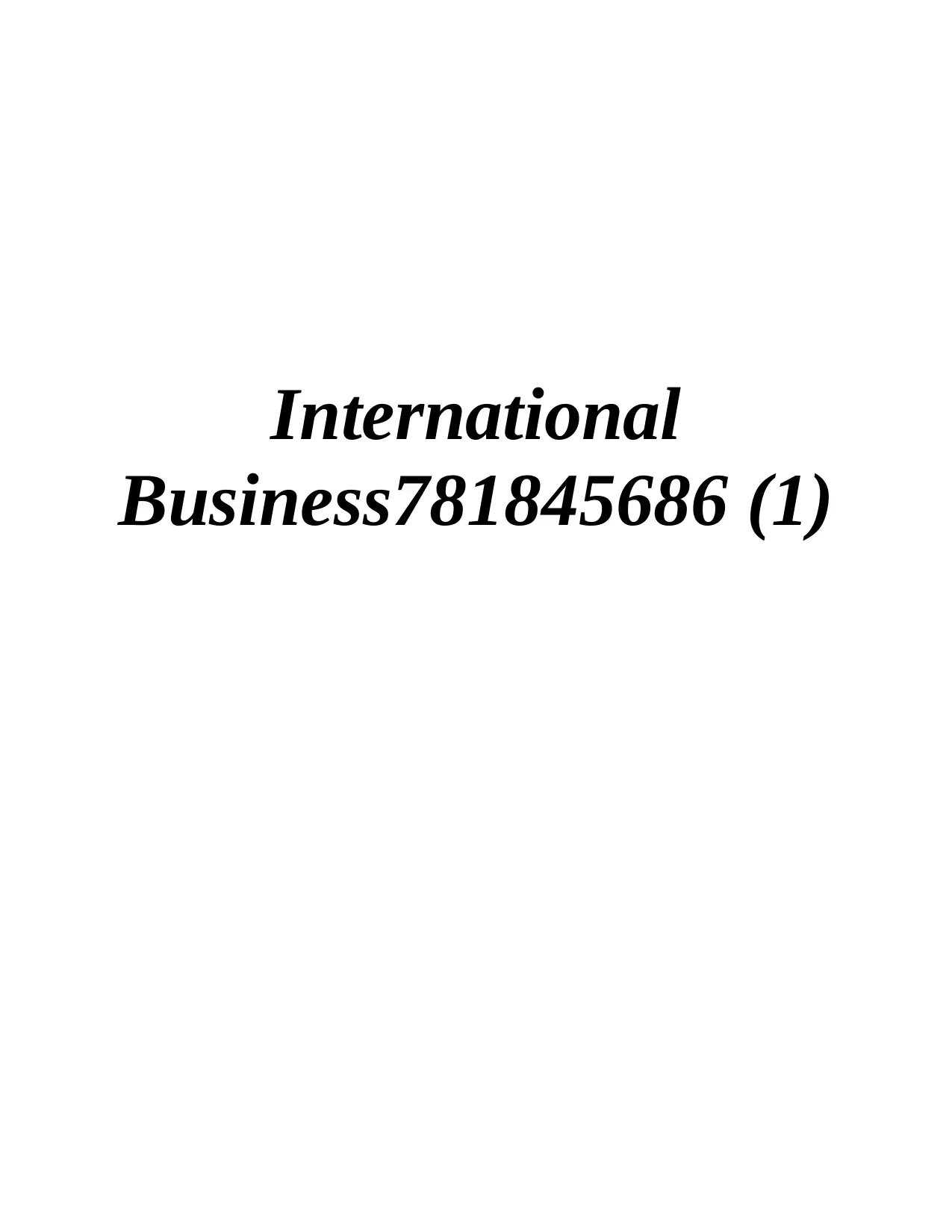
International
Business781845686 (1)
Business781845686 (1)
Paraphrase This Document
Need a fresh take? Get an instant paraphrase of this document with our AI Paraphraser
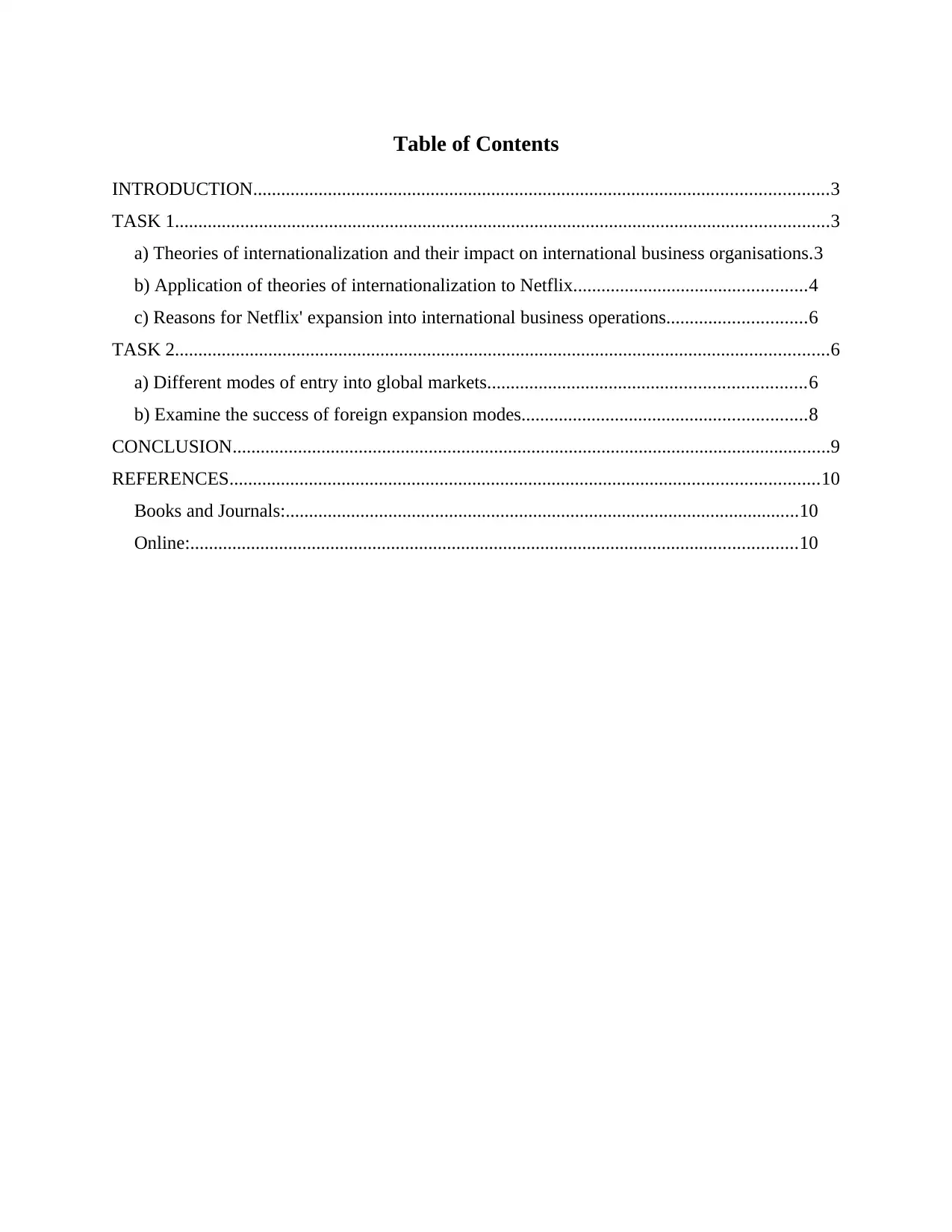
Table of Contents
INTRODUCTION...........................................................................................................................3
TASK 1............................................................................................................................................3
a) Theories of internationalization and their impact on international business organisations.3
b) Application of theories of internationalization to Netflix..................................................4
c) Reasons for Netflix' expansion into international business operations..............................6
TASK 2............................................................................................................................................6
a) Different modes of entry into global markets....................................................................6
b) Examine the success of foreign expansion modes.............................................................8
CONCLUSION................................................................................................................................9
REFERENCES..............................................................................................................................10
Books and Journals:..............................................................................................................10
Online:..................................................................................................................................10
INTRODUCTION...........................................................................................................................3
TASK 1............................................................................................................................................3
a) Theories of internationalization and their impact on international business organisations.3
b) Application of theories of internationalization to Netflix..................................................4
c) Reasons for Netflix' expansion into international business operations..............................6
TASK 2............................................................................................................................................6
a) Different modes of entry into global markets....................................................................6
b) Examine the success of foreign expansion modes.............................................................8
CONCLUSION................................................................................................................................9
REFERENCES..............................................................................................................................10
Books and Journals:..............................................................................................................10
Online:..................................................................................................................................10
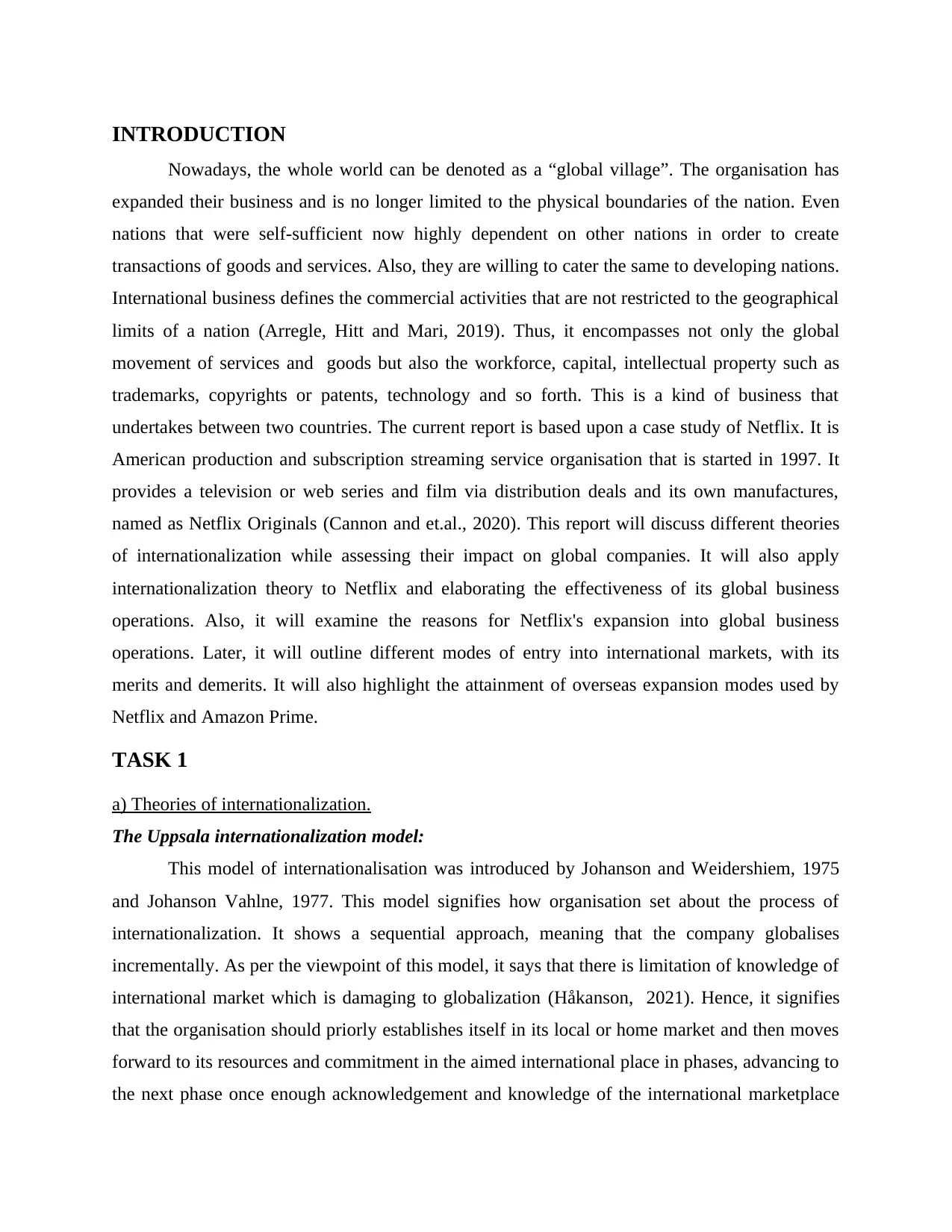
INTRODUCTION
Nowadays, the whole world can be denoted as a “global village”. The organisation has
expanded their business and is no longer limited to the physical boundaries of the nation. Even
nations that were self-sufficient now highly dependent on other nations in order to create
transactions of goods and services. Also, they are willing to cater the same to developing nations.
International business defines the commercial activities that are not restricted to the geographical
limits of a nation (Arregle, Hitt and Mari, 2019). Thus, it encompasses not only the global
movement of services and goods but also the workforce, capital, intellectual property such as
trademarks, copyrights or patents, technology and so forth. This is a kind of business that
undertakes between two countries. The current report is based upon a case study of Netflix. It is
American production and subscription streaming service organisation that is started in 1997. It
provides a television or web series and film via distribution deals and its own manufactures,
named as Netflix Originals (Cannon and et.al., 2020). This report will discuss different theories
of internationalization while assessing their impact on global companies. It will also apply
internationalization theory to Netflix and elaborating the effectiveness of its global business
operations. Also, it will examine the reasons for Netflix's expansion into global business
operations. Later, it will outline different modes of entry into international markets, with its
merits and demerits. It will also highlight the attainment of overseas expansion modes used by
Netflix and Amazon Prime.
TASK 1
a) Theories of internationalization.
The Uppsala internationalization model:
This model of internationalisation was introduced by Johanson and Weidershiem, 1975
and Johanson Vahlne, 1977. This model signifies how organisation set about the process of
internationalization. It shows a sequential approach, meaning that the company globalises
incrementally. As per the viewpoint of this model, it says that there is limitation of knowledge of
international market which is damaging to globalization (Håkanson, 2021). Hence, it signifies
that the organisation should priorly establishes itself in its local or home market and then moves
forward to its resources and commitment in the aimed international place in phases, advancing to
the next phase once enough acknowledgement and knowledge of the international marketplace
Nowadays, the whole world can be denoted as a “global village”. The organisation has
expanded their business and is no longer limited to the physical boundaries of the nation. Even
nations that were self-sufficient now highly dependent on other nations in order to create
transactions of goods and services. Also, they are willing to cater the same to developing nations.
International business defines the commercial activities that are not restricted to the geographical
limits of a nation (Arregle, Hitt and Mari, 2019). Thus, it encompasses not only the global
movement of services and goods but also the workforce, capital, intellectual property such as
trademarks, copyrights or patents, technology and so forth. This is a kind of business that
undertakes between two countries. The current report is based upon a case study of Netflix. It is
American production and subscription streaming service organisation that is started in 1997. It
provides a television or web series and film via distribution deals and its own manufactures,
named as Netflix Originals (Cannon and et.al., 2020). This report will discuss different theories
of internationalization while assessing their impact on global companies. It will also apply
internationalization theory to Netflix and elaborating the effectiveness of its global business
operations. Also, it will examine the reasons for Netflix's expansion into global business
operations. Later, it will outline different modes of entry into international markets, with its
merits and demerits. It will also highlight the attainment of overseas expansion modes used by
Netflix and Amazon Prime.
TASK 1
a) Theories of internationalization.
The Uppsala internationalization model:
This model of internationalisation was introduced by Johanson and Weidershiem, 1975
and Johanson Vahlne, 1977. This model signifies how organisation set about the process of
internationalization. It shows a sequential approach, meaning that the company globalises
incrementally. As per the viewpoint of this model, it says that there is limitation of knowledge of
international market which is damaging to globalization (Håkanson, 2021). Hence, it signifies
that the organisation should priorly establishes itself in its local or home market and then moves
forward to its resources and commitment in the aimed international place in phases, advancing to
the next phase once enough acknowledgement and knowledge of the international marketplace
⊘ This is a preview!⊘
Do you want full access?
Subscribe today to unlock all pages.

Trusted by 1+ million students worldwide
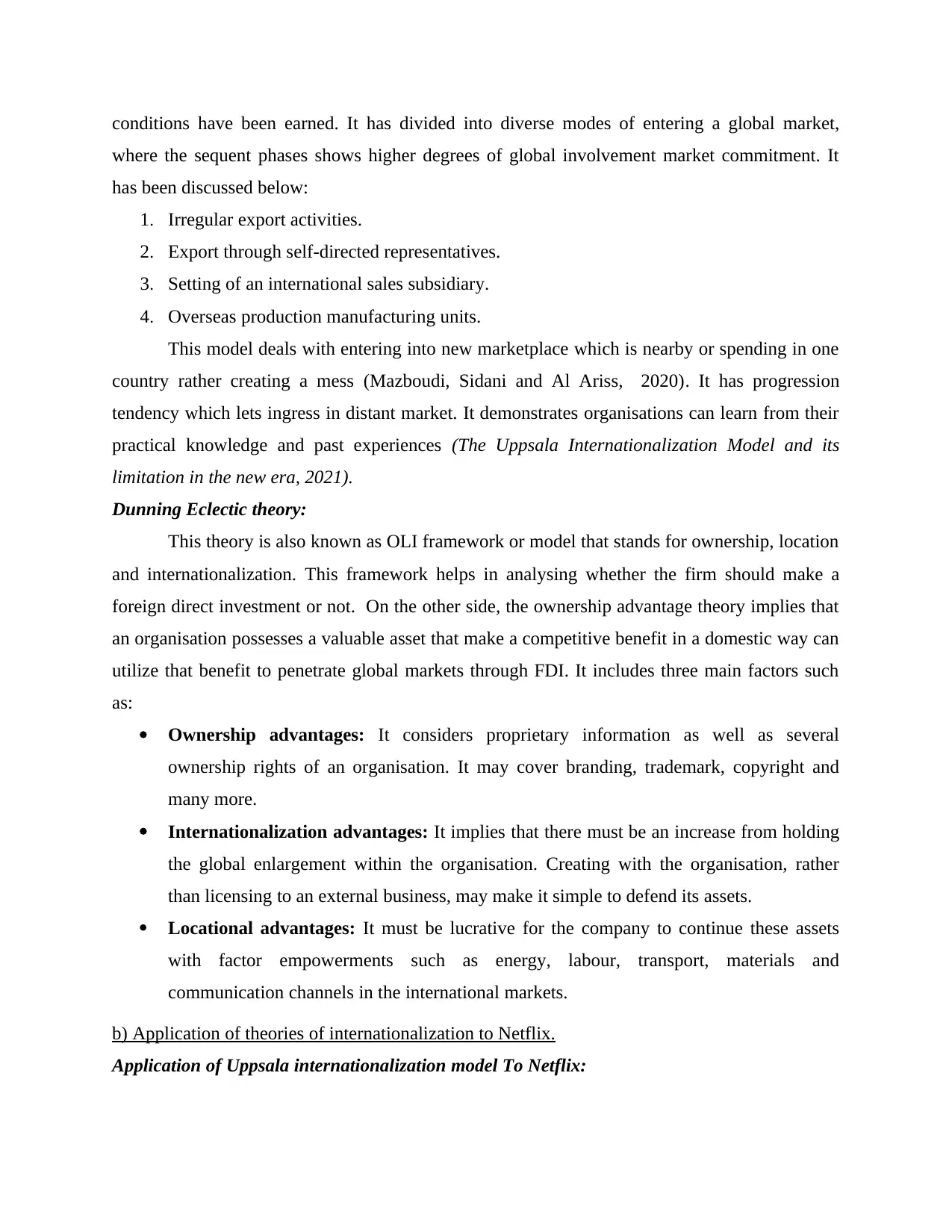
conditions have been earned. It has divided into diverse modes of entering a global market,
where the sequent phases shows higher degrees of global involvement market commitment. It
has been discussed below:
1. Irregular export activities.
2. Export through self-directed representatives.
3. Setting of an international sales subsidiary.
4. Overseas production manufacturing units.
This model deals with entering into new marketplace which is nearby or spending in one
country rather creating a mess (Mazboudi, Sidani and Al Ariss, 2020). It has progression
tendency which lets ingress in distant market. It demonstrates organisations can learn from their
practical knowledge and past experiences (The Uppsala Internationalization Model and its
limitation in the new era, 2021).
Dunning Eclectic theory:
This theory is also known as OLI framework or model that stands for ownership, location
and internationalization. This framework helps in analysing whether the firm should make a
foreign direct investment or not. On the other side, the ownership advantage theory implies that
an organisation possesses a valuable asset that make a competitive benefit in a domestic way can
utilize that benefit to penetrate global markets through FDI. It includes three main factors such
as:
Ownership advantages: It considers proprietary information as well as several
ownership rights of an organisation. It may cover branding, trademark, copyright and
many more.
Internationalization advantages: It implies that there must be an increase from holding
the global enlargement within the organisation. Creating with the organisation, rather
than licensing to an external business, may make it simple to defend its assets.
Locational advantages: It must be lucrative for the company to continue these assets
with factor empowerments such as energy, labour, transport, materials and
communication channels in the international markets.
b) Application of theories of internationalization to Netflix.
Application of Uppsala internationalization model To Netflix:
where the sequent phases shows higher degrees of global involvement market commitment. It
has been discussed below:
1. Irregular export activities.
2. Export through self-directed representatives.
3. Setting of an international sales subsidiary.
4. Overseas production manufacturing units.
This model deals with entering into new marketplace which is nearby or spending in one
country rather creating a mess (Mazboudi, Sidani and Al Ariss, 2020). It has progression
tendency which lets ingress in distant market. It demonstrates organisations can learn from their
practical knowledge and past experiences (The Uppsala Internationalization Model and its
limitation in the new era, 2021).
Dunning Eclectic theory:
This theory is also known as OLI framework or model that stands for ownership, location
and internationalization. This framework helps in analysing whether the firm should make a
foreign direct investment or not. On the other side, the ownership advantage theory implies that
an organisation possesses a valuable asset that make a competitive benefit in a domestic way can
utilize that benefit to penetrate global markets through FDI. It includes three main factors such
as:
Ownership advantages: It considers proprietary information as well as several
ownership rights of an organisation. It may cover branding, trademark, copyright and
many more.
Internationalization advantages: It implies that there must be an increase from holding
the global enlargement within the organisation. Creating with the organisation, rather
than licensing to an external business, may make it simple to defend its assets.
Locational advantages: It must be lucrative for the company to continue these assets
with factor empowerments such as energy, labour, transport, materials and
communication channels in the international markets.
b) Application of theories of internationalization to Netflix.
Application of Uppsala internationalization model To Netflix:
Paraphrase This Document
Need a fresh take? Get an instant paraphrase of this document with our AI Paraphraser
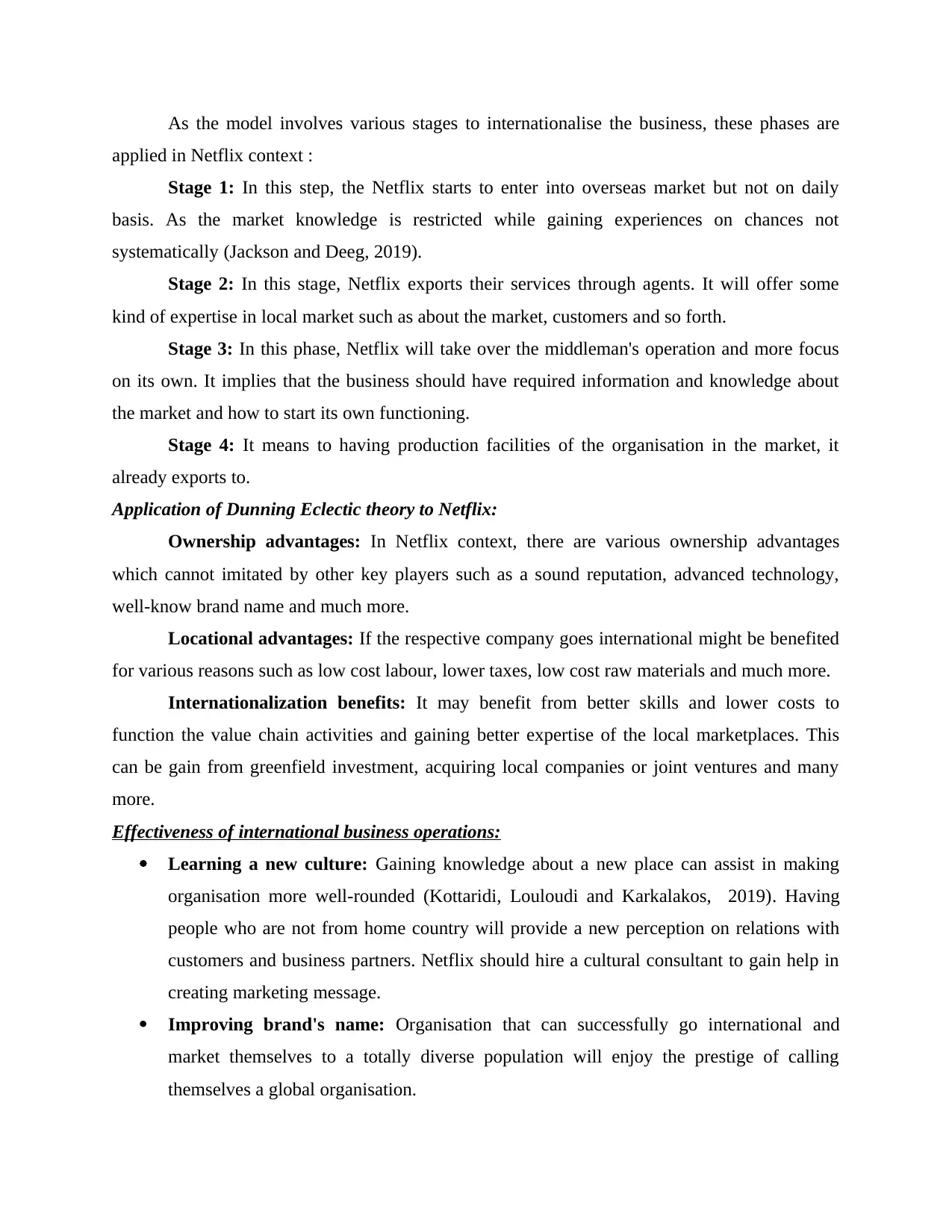
As the model involves various stages to internationalise the business, these phases are
applied in Netflix context :
Stage 1: In this step, the Netflix starts to enter into overseas market but not on daily
basis. As the market knowledge is restricted while gaining experiences on chances not
systematically (Jackson and Deeg, 2019).
Stage 2: In this stage, Netflix exports their services through agents. It will offer some
kind of expertise in local market such as about the market, customers and so forth.
Stage 3: In this phase, Netflix will take over the middleman's operation and more focus
on its own. It implies that the business should have required information and knowledge about
the market and how to start its own functioning.
Stage 4: It means to having production facilities of the organisation in the market, it
already exports to.
Application of Dunning Eclectic theory to Netflix:
Ownership advantages: In Netflix context, there are various ownership advantages
which cannot imitated by other key players such as a sound reputation, advanced technology,
well-know brand name and much more.
Locational advantages: If the respective company goes international might be benefited
for various reasons such as low cost labour, lower taxes, low cost raw materials and much more.
Internationalization benefits: It may benefit from better skills and lower costs to
function the value chain activities and gaining better expertise of the local marketplaces. This
can be gain from greenfield investment, acquiring local companies or joint ventures and many
more.
Effectiveness of international business operations:
Learning a new culture: Gaining knowledge about a new place can assist in making
organisation more well-rounded (Kottaridi, Louloudi and Karkalakos, 2019). Having
people who are not from home country will provide a new perception on relations with
customers and business partners. Netflix should hire a cultural consultant to gain help in
creating marketing message.
Improving brand's name: Organisation that can successfully go international and
market themselves to a totally diverse population will enjoy the prestige of calling
themselves a global organisation.
applied in Netflix context :
Stage 1: In this step, the Netflix starts to enter into overseas market but not on daily
basis. As the market knowledge is restricted while gaining experiences on chances not
systematically (Jackson and Deeg, 2019).
Stage 2: In this stage, Netflix exports their services through agents. It will offer some
kind of expertise in local market such as about the market, customers and so forth.
Stage 3: In this phase, Netflix will take over the middleman's operation and more focus
on its own. It implies that the business should have required information and knowledge about
the market and how to start its own functioning.
Stage 4: It means to having production facilities of the organisation in the market, it
already exports to.
Application of Dunning Eclectic theory to Netflix:
Ownership advantages: In Netflix context, there are various ownership advantages
which cannot imitated by other key players such as a sound reputation, advanced technology,
well-know brand name and much more.
Locational advantages: If the respective company goes international might be benefited
for various reasons such as low cost labour, lower taxes, low cost raw materials and much more.
Internationalization benefits: It may benefit from better skills and lower costs to
function the value chain activities and gaining better expertise of the local marketplaces. This
can be gain from greenfield investment, acquiring local companies or joint ventures and many
more.
Effectiveness of international business operations:
Learning a new culture: Gaining knowledge about a new place can assist in making
organisation more well-rounded (Kottaridi, Louloudi and Karkalakos, 2019). Having
people who are not from home country will provide a new perception on relations with
customers and business partners. Netflix should hire a cultural consultant to gain help in
creating marketing message.
Improving brand's name: Organisation that can successfully go international and
market themselves to a totally diverse population will enjoy the prestige of calling
themselves a global organisation.
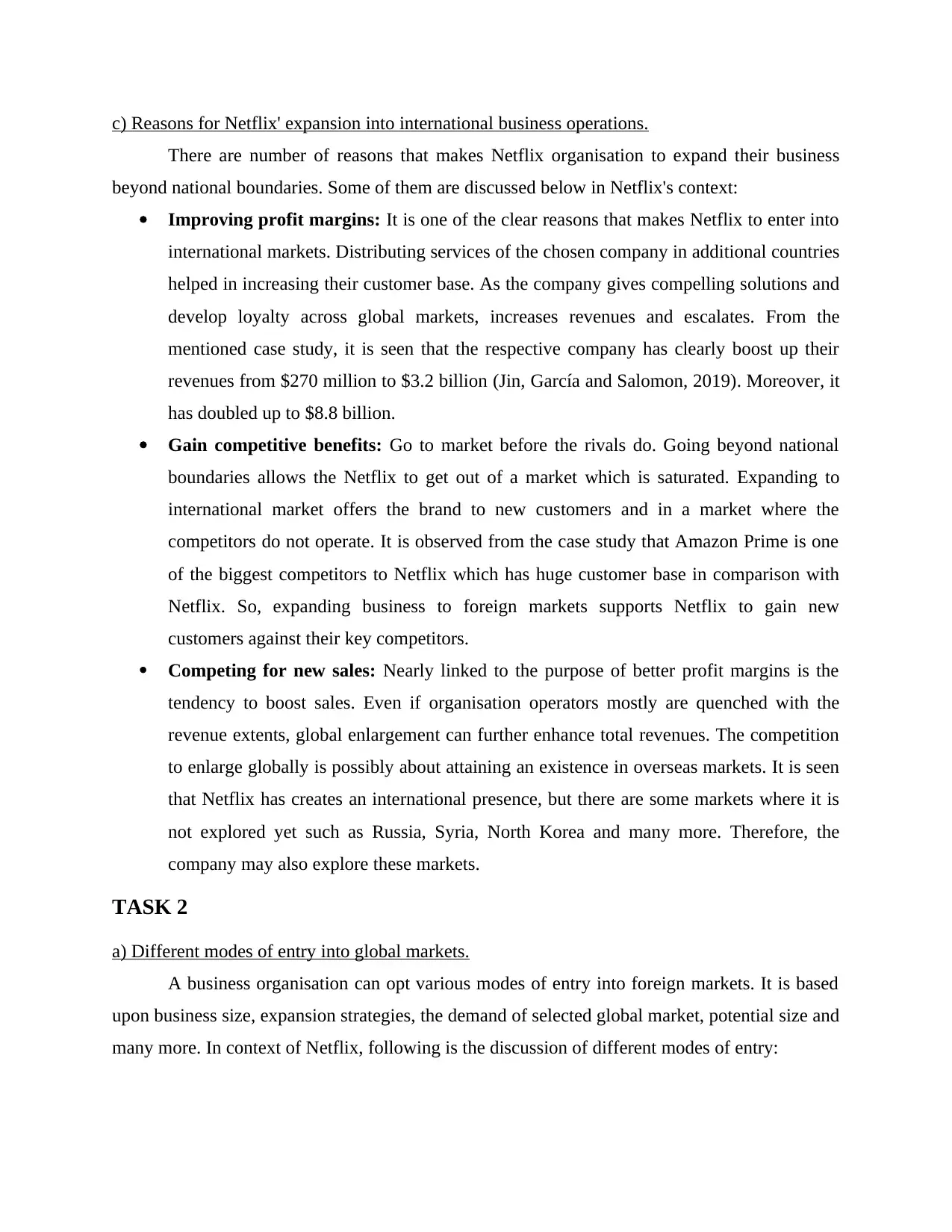
c) Reasons for Netflix' expansion into international business operations.
There are number of reasons that makes Netflix organisation to expand their business
beyond national boundaries. Some of them are discussed below in Netflix's context:
Improving profit margins: It is one of the clear reasons that makes Netflix to enter into
international markets. Distributing services of the chosen company in additional countries
helped in increasing their customer base. As the company gives compelling solutions and
develop loyalty across global markets, increases revenues and escalates. From the
mentioned case study, it is seen that the respective company has clearly boost up their
revenues from $270 million to $3.2 billion (Jin, García and Salomon, 2019). Moreover, it
has doubled up to $8.8 billion.
Gain competitive benefits: Go to market before the rivals do. Going beyond national
boundaries allows the Netflix to get out of a market which is saturated. Expanding to
international market offers the brand to new customers and in a market where the
competitors do not operate. It is observed from the case study that Amazon Prime is one
of the biggest competitors to Netflix which has huge customer base in comparison with
Netflix. So, expanding business to foreign markets supports Netflix to gain new
customers against their key competitors.
Competing for new sales: Nearly linked to the purpose of better profit margins is the
tendency to boost sales. Even if organisation operators mostly are quenched with the
revenue extents, global enlargement can further enhance total revenues. The competition
to enlarge globally is possibly about attaining an existence in overseas markets. It is seen
that Netflix has creates an international presence, but there are some markets where it is
not explored yet such as Russia, Syria, North Korea and many more. Therefore, the
company may also explore these markets.
TASK 2
a) Different modes of entry into global markets.
A business organisation can opt various modes of entry into foreign markets. It is based
upon business size, expansion strategies, the demand of selected global market, potential size and
many more. In context of Netflix, following is the discussion of different modes of entry:
There are number of reasons that makes Netflix organisation to expand their business
beyond national boundaries. Some of them are discussed below in Netflix's context:
Improving profit margins: It is one of the clear reasons that makes Netflix to enter into
international markets. Distributing services of the chosen company in additional countries
helped in increasing their customer base. As the company gives compelling solutions and
develop loyalty across global markets, increases revenues and escalates. From the
mentioned case study, it is seen that the respective company has clearly boost up their
revenues from $270 million to $3.2 billion (Jin, García and Salomon, 2019). Moreover, it
has doubled up to $8.8 billion.
Gain competitive benefits: Go to market before the rivals do. Going beyond national
boundaries allows the Netflix to get out of a market which is saturated. Expanding to
international market offers the brand to new customers and in a market where the
competitors do not operate. It is observed from the case study that Amazon Prime is one
of the biggest competitors to Netflix which has huge customer base in comparison with
Netflix. So, expanding business to foreign markets supports Netflix to gain new
customers against their key competitors.
Competing for new sales: Nearly linked to the purpose of better profit margins is the
tendency to boost sales. Even if organisation operators mostly are quenched with the
revenue extents, global enlargement can further enhance total revenues. The competition
to enlarge globally is possibly about attaining an existence in overseas markets. It is seen
that Netflix has creates an international presence, but there are some markets where it is
not explored yet such as Russia, Syria, North Korea and many more. Therefore, the
company may also explore these markets.
TASK 2
a) Different modes of entry into global markets.
A business organisation can opt various modes of entry into foreign markets. It is based
upon business size, expansion strategies, the demand of selected global market, potential size and
many more. In context of Netflix, following is the discussion of different modes of entry:
⊘ This is a preview!⊘
Do you want full access?
Subscribe today to unlock all pages.

Trusted by 1+ million students worldwide
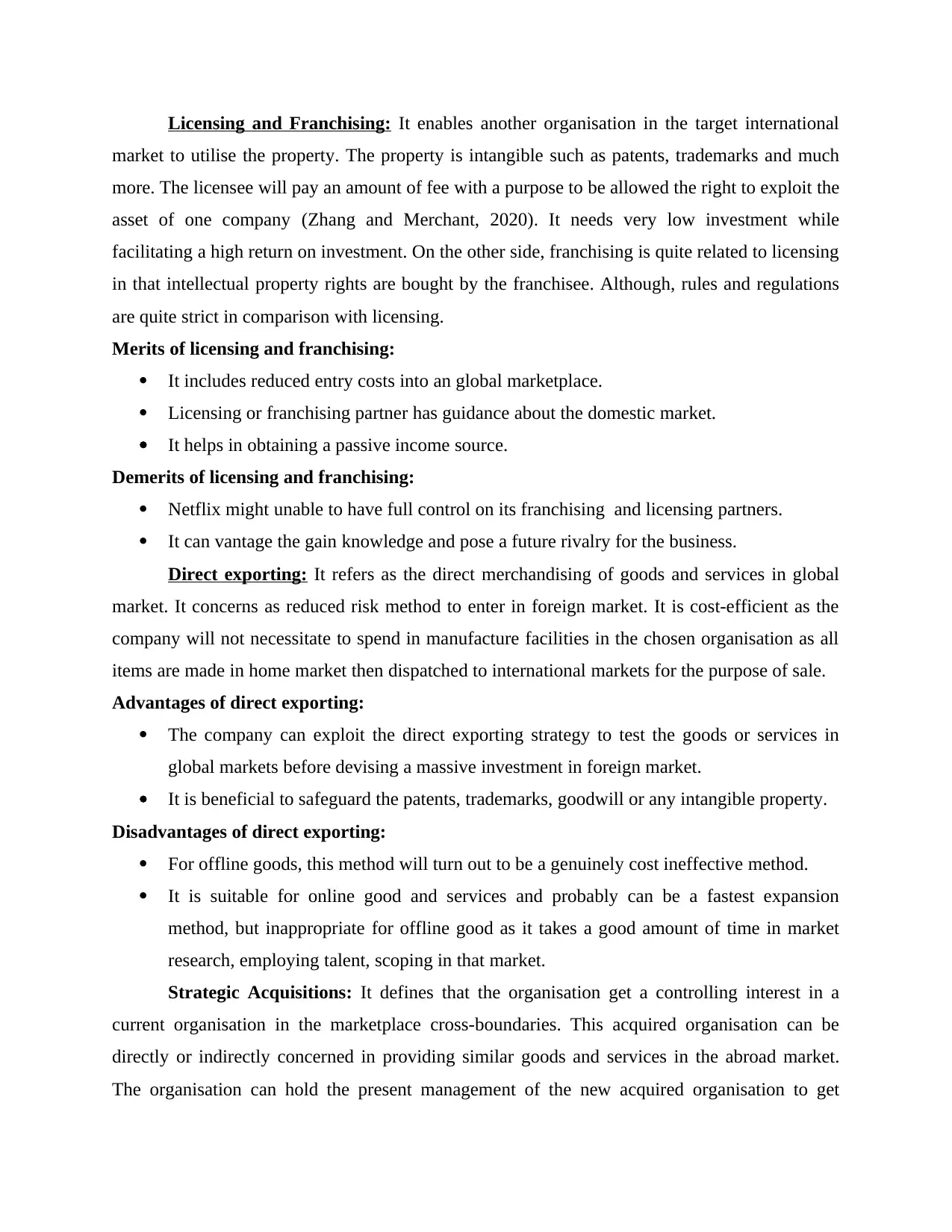
Licensing and Franchising: It enables another organisation in the target international
market to utilise the property. The property is intangible such as patents, trademarks and much
more. The licensee will pay an amount of fee with a purpose to be allowed the right to exploit the
asset of one company (Zhang and Merchant, 2020). It needs very low investment while
facilitating a high return on investment. On the other side, franchising is quite related to licensing
in that intellectual property rights are bought by the franchisee. Although, rules and regulations
are quite strict in comparison with licensing.
Merits of licensing and franchising:
It includes reduced entry costs into an global marketplace.
Licensing or franchising partner has guidance about the domestic market.
It helps in obtaining a passive income source.
Demerits of licensing and franchising:
Netflix might unable to have full control on its franchising and licensing partners.
It can vantage the gain knowledge and pose a future rivalry for the business.
Direct exporting: It refers as the direct merchandising of goods and services in global
market. It concerns as reduced risk method to enter in foreign market. It is cost-efficient as the
company will not necessitate to spend in manufacture facilities in the chosen organisation as all
items are made in home market then dispatched to international markets for the purpose of sale.
Advantages of direct exporting:
The company can exploit the direct exporting strategy to test the goods or services in
global markets before devising a massive investment in foreign market.
It is beneficial to safeguard the patents, trademarks, goodwill or any intangible property.
Disadvantages of direct exporting:
For offline goods, this method will turn out to be a genuinely cost ineffective method.
It is suitable for online good and services and probably can be a fastest expansion
method, but inappropriate for offline good as it takes a good amount of time in market
research, employing talent, scoping in that market.
Strategic Acquisitions: It defines that the organisation get a controlling interest in a
current organisation in the marketplace cross-boundaries. This acquired organisation can be
directly or indirectly concerned in providing similar goods and services in the abroad market.
The organisation can hold the present management of the new acquired organisation to get
market to utilise the property. The property is intangible such as patents, trademarks and much
more. The licensee will pay an amount of fee with a purpose to be allowed the right to exploit the
asset of one company (Zhang and Merchant, 2020). It needs very low investment while
facilitating a high return on investment. On the other side, franchising is quite related to licensing
in that intellectual property rights are bought by the franchisee. Although, rules and regulations
are quite strict in comparison with licensing.
Merits of licensing and franchising:
It includes reduced entry costs into an global marketplace.
Licensing or franchising partner has guidance about the domestic market.
It helps in obtaining a passive income source.
Demerits of licensing and franchising:
Netflix might unable to have full control on its franchising and licensing partners.
It can vantage the gain knowledge and pose a future rivalry for the business.
Direct exporting: It refers as the direct merchandising of goods and services in global
market. It concerns as reduced risk method to enter in foreign market. It is cost-efficient as the
company will not necessitate to spend in manufacture facilities in the chosen organisation as all
items are made in home market then dispatched to international markets for the purpose of sale.
Advantages of direct exporting:
The company can exploit the direct exporting strategy to test the goods or services in
global markets before devising a massive investment in foreign market.
It is beneficial to safeguard the patents, trademarks, goodwill or any intangible property.
Disadvantages of direct exporting:
For offline goods, this method will turn out to be a genuinely cost ineffective method.
It is suitable for online good and services and probably can be a fastest expansion
method, but inappropriate for offline good as it takes a good amount of time in market
research, employing talent, scoping in that market.
Strategic Acquisitions: It defines that the organisation get a controlling interest in a
current organisation in the marketplace cross-boundaries. This acquired organisation can be
directly or indirectly concerned in providing similar goods and services in the abroad market.
The organisation can hold the present management of the new acquired organisation to get
Paraphrase This Document
Need a fresh take? Get an instant paraphrase of this document with our AI Paraphraser
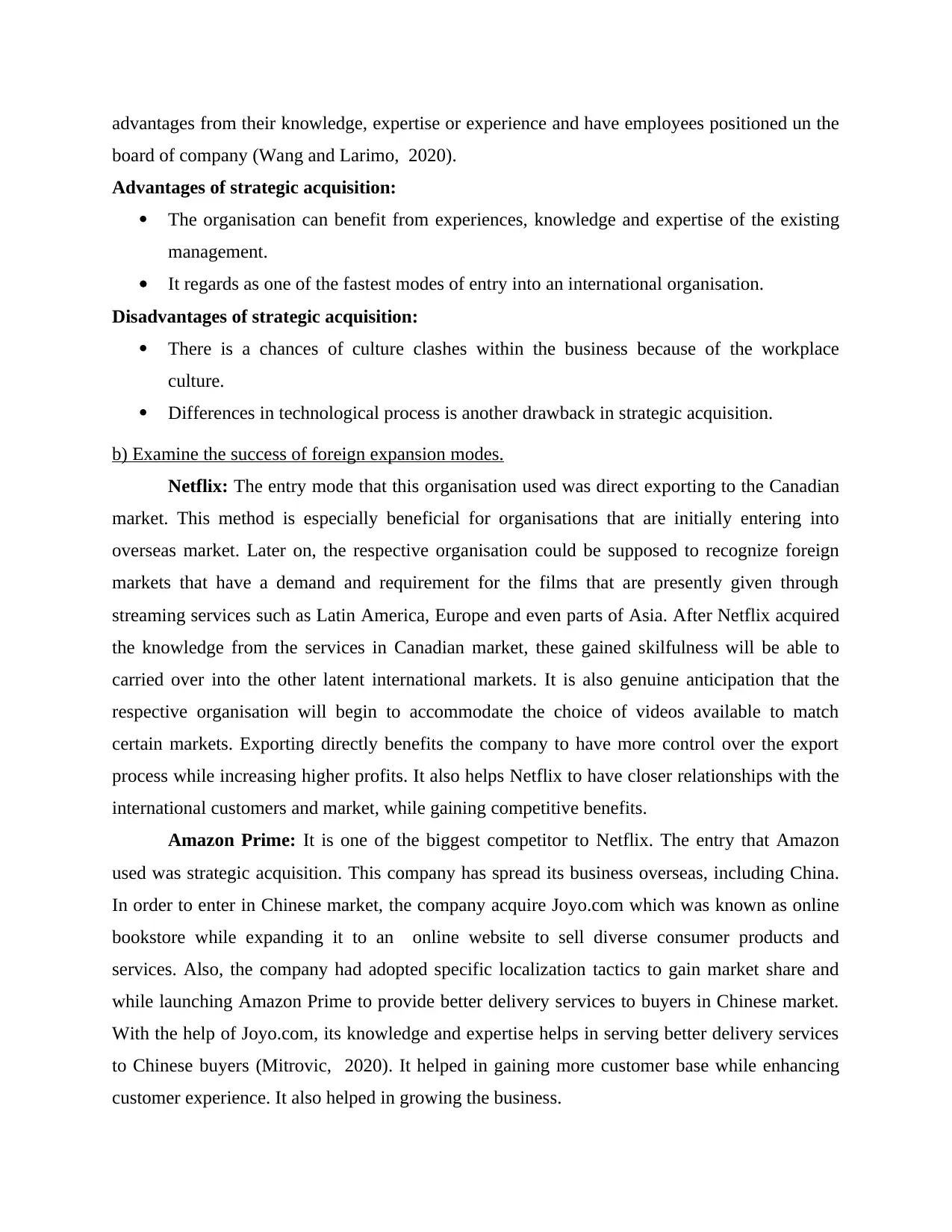
advantages from their knowledge, expertise or experience and have employees positioned un the
board of company (Wang and Larimo, 2020).
Advantages of strategic acquisition:
The organisation can benefit from experiences, knowledge and expertise of the existing
management.
It regards as one of the fastest modes of entry into an international organisation.
Disadvantages of strategic acquisition:
There is a chances of culture clashes within the business because of the workplace
culture.
Differences in technological process is another drawback in strategic acquisition.
b) Examine the success of foreign expansion modes.
Netflix: The entry mode that this organisation used was direct exporting to the Canadian
market. This method is especially beneficial for organisations that are initially entering into
overseas market. Later on, the respective organisation could be supposed to recognize foreign
markets that have a demand and requirement for the films that are presently given through
streaming services such as Latin America, Europe and even parts of Asia. After Netflix acquired
the knowledge from the services in Canadian market, these gained skilfulness will be able to
carried over into the other latent international markets. It is also genuine anticipation that the
respective organisation will begin to accommodate the choice of videos available to match
certain markets. Exporting directly benefits the company to have more control over the export
process while increasing higher profits. It also helps Netflix to have closer relationships with the
international customers and market, while gaining competitive benefits.
Amazon Prime: It is one of the biggest competitor to Netflix. The entry that Amazon
used was strategic acquisition. This company has spread its business overseas, including China.
In order to enter in Chinese market, the company acquire Joyo.com which was known as online
bookstore while expanding it to an online website to sell diverse consumer products and
services. Also, the company had adopted specific localization tactics to gain market share and
while launching Amazon Prime to provide better delivery services to buyers in Chinese market.
With the help of Joyo.com, its knowledge and expertise helps in serving better delivery services
to Chinese buyers (Mitrovic, 2020). It helped in gaining more customer base while enhancing
customer experience. It also helped in growing the business.
board of company (Wang and Larimo, 2020).
Advantages of strategic acquisition:
The organisation can benefit from experiences, knowledge and expertise of the existing
management.
It regards as one of the fastest modes of entry into an international organisation.
Disadvantages of strategic acquisition:
There is a chances of culture clashes within the business because of the workplace
culture.
Differences in technological process is another drawback in strategic acquisition.
b) Examine the success of foreign expansion modes.
Netflix: The entry mode that this organisation used was direct exporting to the Canadian
market. This method is especially beneficial for organisations that are initially entering into
overseas market. Later on, the respective organisation could be supposed to recognize foreign
markets that have a demand and requirement for the films that are presently given through
streaming services such as Latin America, Europe and even parts of Asia. After Netflix acquired
the knowledge from the services in Canadian market, these gained skilfulness will be able to
carried over into the other latent international markets. It is also genuine anticipation that the
respective organisation will begin to accommodate the choice of videos available to match
certain markets. Exporting directly benefits the company to have more control over the export
process while increasing higher profits. It also helps Netflix to have closer relationships with the
international customers and market, while gaining competitive benefits.
Amazon Prime: It is one of the biggest competitor to Netflix. The entry that Amazon
used was strategic acquisition. This company has spread its business overseas, including China.
In order to enter in Chinese market, the company acquire Joyo.com which was known as online
bookstore while expanding it to an online website to sell diverse consumer products and
services. Also, the company had adopted specific localization tactics to gain market share and
while launching Amazon Prime to provide better delivery services to buyers in Chinese market.
With the help of Joyo.com, its knowledge and expertise helps in serving better delivery services
to Chinese buyers (Mitrovic, 2020). It helped in gaining more customer base while enhancing
customer experience. It also helped in growing the business.
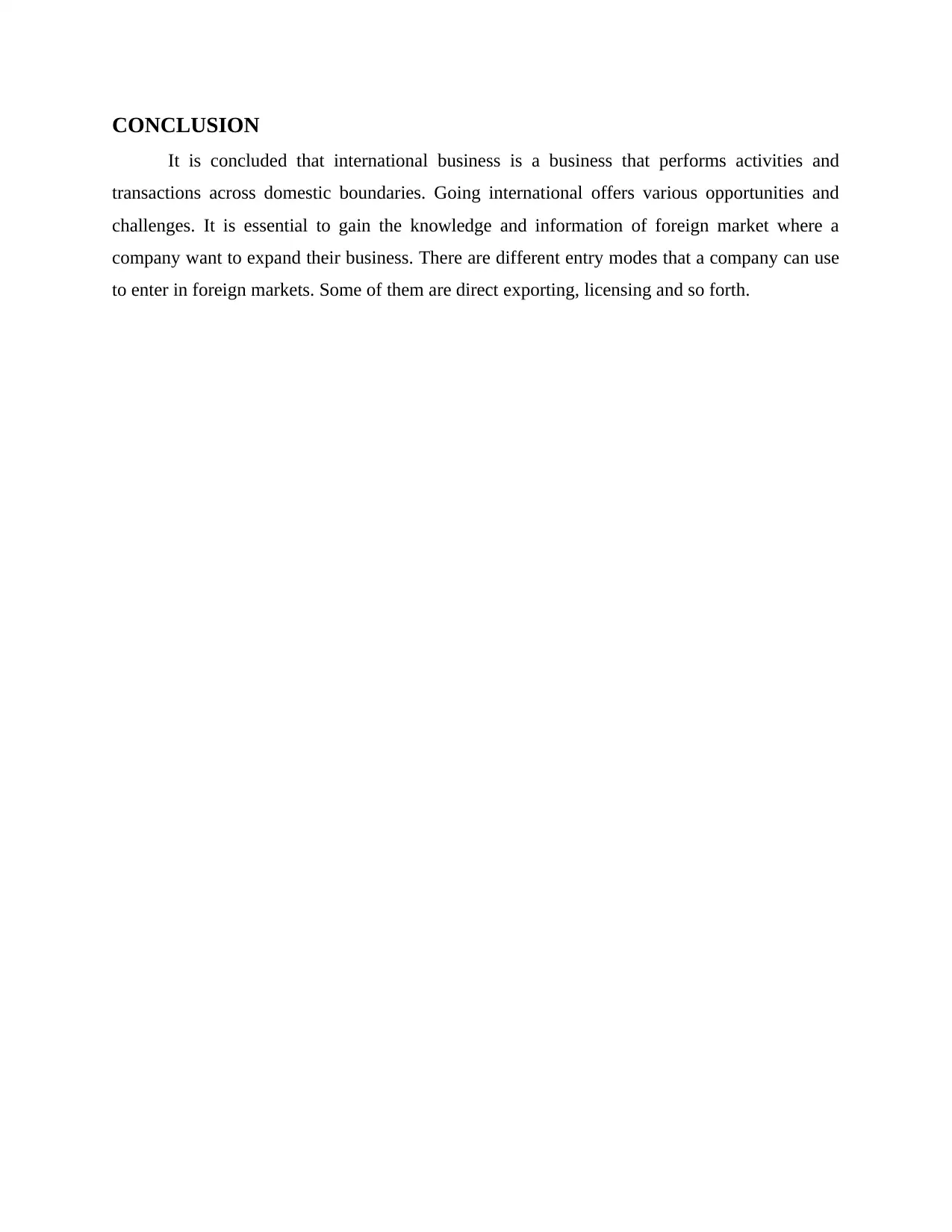
CONCLUSION
It is concluded that international business is a business that performs activities and
transactions across domestic boundaries. Going international offers various opportunities and
challenges. It is essential to gain the knowledge and information of foreign market where a
company want to expand their business. There are different entry modes that a company can use
to enter in foreign markets. Some of them are direct exporting, licensing and so forth.
It is concluded that international business is a business that performs activities and
transactions across domestic boundaries. Going international offers various opportunities and
challenges. It is essential to gain the knowledge and information of foreign market where a
company want to expand their business. There are different entry modes that a company can use
to enter in foreign markets. Some of them are direct exporting, licensing and so forth.
⊘ This is a preview!⊘
Do you want full access?
Subscribe today to unlock all pages.

Trusted by 1+ million students worldwide
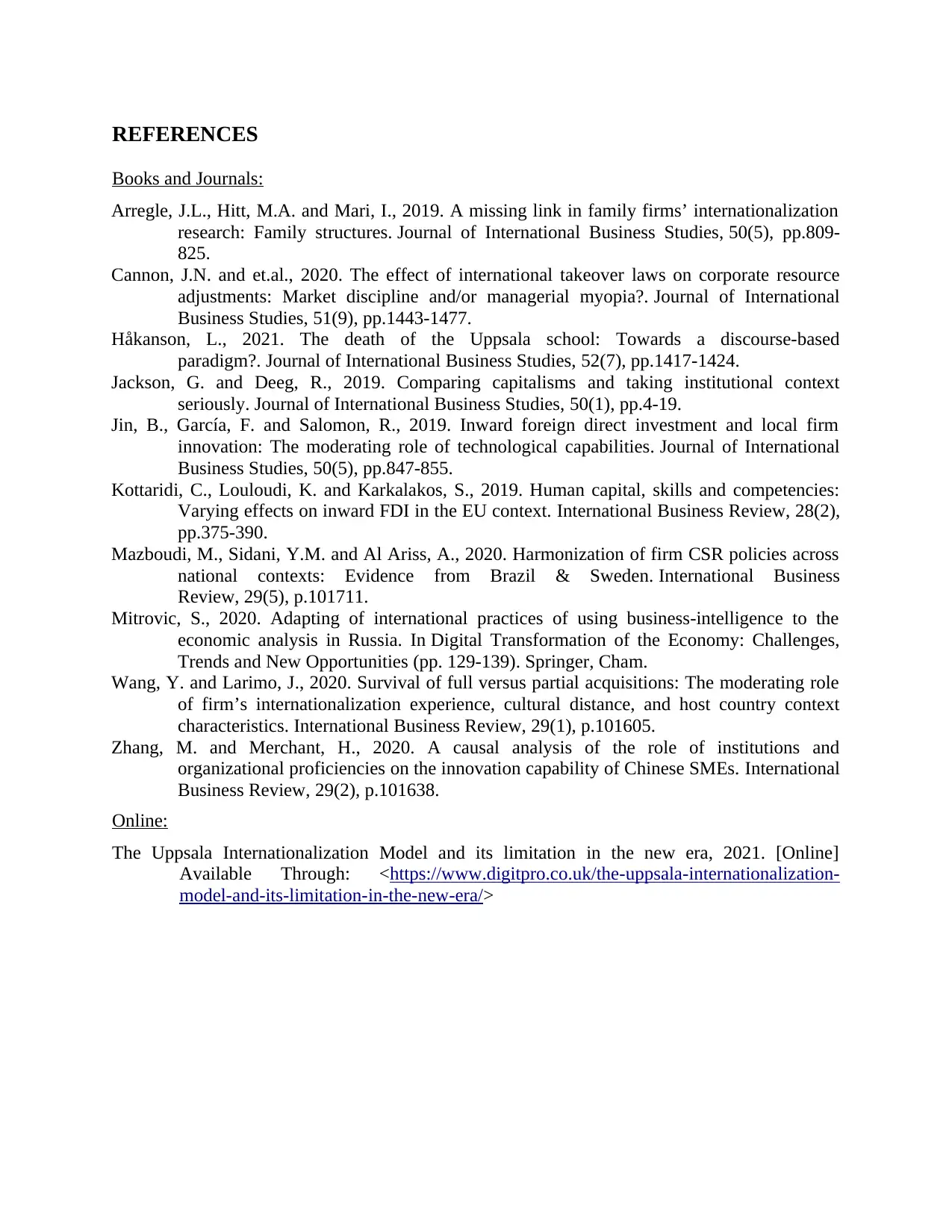
REFERENCES
Books and Journals:
Arregle, J.L., Hitt, M.A. and Mari, I., 2019. A missing link in family firms’ internationalization
research: Family structures. Journal of International Business Studies, 50(5), pp.809-
825.
Cannon, J.N. and et.al., 2020. The effect of international takeover laws on corporate resource
adjustments: Market discipline and/or managerial myopia?. Journal of International
Business Studies, 51(9), pp.1443-1477.
Håkanson, L., 2021. The death of the Uppsala school: Towards a discourse-based
paradigm?. Journal of International Business Studies, 52(7), pp.1417-1424.
Jackson, G. and Deeg, R., 2019. Comparing capitalisms and taking institutional context
seriously. Journal of International Business Studies, 50(1), pp.4-19.
Jin, B., García, F. and Salomon, R., 2019. Inward foreign direct investment and local firm
innovation: The moderating role of technological capabilities. Journal of International
Business Studies, 50(5), pp.847-855.
Kottaridi, C., Louloudi, K. and Karkalakos, S., 2019. Human capital, skills and competencies:
Varying effects on inward FDI in the EU context. International Business Review, 28(2),
pp.375-390.
Mazboudi, M., Sidani, Y.M. and Al Ariss, A., 2020. Harmonization of firm CSR policies across
national contexts: Evidence from Brazil & Sweden. International Business
Review, 29(5), p.101711.
Mitrovic, S., 2020. Adapting of international practices of using business-intelligence to the
economic analysis in Russia. In Digital Transformation of the Economy: Challenges,
Trends and New Opportunities (pp. 129-139). Springer, Cham.
Wang, Y. and Larimo, J., 2020. Survival of full versus partial acquisitions: The moderating role
of firm’s internationalization experience, cultural distance, and host country context
characteristics. International Business Review, 29(1), p.101605.
Zhang, M. and Merchant, H., 2020. A causal analysis of the role of institutions and
organizational proficiencies on the innovation capability of Chinese SMEs. International
Business Review, 29(2), p.101638.
Online:
The Uppsala Internationalization Model and its limitation in the new era, 2021. [Online]
Available Through: <https://www.digitpro.co.uk/the-uppsala-internationalization-
model-and-its-limitation-in-the-new-era/>
Books and Journals:
Arregle, J.L., Hitt, M.A. and Mari, I., 2019. A missing link in family firms’ internationalization
research: Family structures. Journal of International Business Studies, 50(5), pp.809-
825.
Cannon, J.N. and et.al., 2020. The effect of international takeover laws on corporate resource
adjustments: Market discipline and/or managerial myopia?. Journal of International
Business Studies, 51(9), pp.1443-1477.
Håkanson, L., 2021. The death of the Uppsala school: Towards a discourse-based
paradigm?. Journal of International Business Studies, 52(7), pp.1417-1424.
Jackson, G. and Deeg, R., 2019. Comparing capitalisms and taking institutional context
seriously. Journal of International Business Studies, 50(1), pp.4-19.
Jin, B., García, F. and Salomon, R., 2019. Inward foreign direct investment and local firm
innovation: The moderating role of technological capabilities. Journal of International
Business Studies, 50(5), pp.847-855.
Kottaridi, C., Louloudi, K. and Karkalakos, S., 2019. Human capital, skills and competencies:
Varying effects on inward FDI in the EU context. International Business Review, 28(2),
pp.375-390.
Mazboudi, M., Sidani, Y.M. and Al Ariss, A., 2020. Harmonization of firm CSR policies across
national contexts: Evidence from Brazil & Sweden. International Business
Review, 29(5), p.101711.
Mitrovic, S., 2020. Adapting of international practices of using business-intelligence to the
economic analysis in Russia. In Digital Transformation of the Economy: Challenges,
Trends and New Opportunities (pp. 129-139). Springer, Cham.
Wang, Y. and Larimo, J., 2020. Survival of full versus partial acquisitions: The moderating role
of firm’s internationalization experience, cultural distance, and host country context
characteristics. International Business Review, 29(1), p.101605.
Zhang, M. and Merchant, H., 2020. A causal analysis of the role of institutions and
organizational proficiencies on the innovation capability of Chinese SMEs. International
Business Review, 29(2), p.101638.
Online:
The Uppsala Internationalization Model and its limitation in the new era, 2021. [Online]
Available Through: <https://www.digitpro.co.uk/the-uppsala-internationalization-
model-and-its-limitation-in-the-new-era/>
1 out of 10
Related Documents
Your All-in-One AI-Powered Toolkit for Academic Success.
+13062052269
info@desklib.com
Available 24*7 on WhatsApp / Email
![[object Object]](/_next/static/media/star-bottom.7253800d.svg)
Unlock your academic potential
Copyright © 2020–2026 A2Z Services. All Rights Reserved. Developed and managed by ZUCOL.





